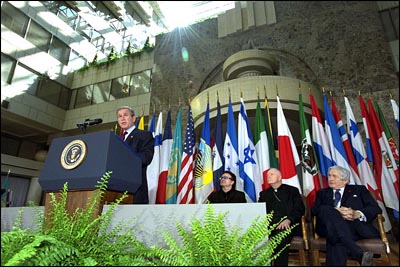
- Afghanistan
- Africa
- Budget Management
- Defense
- Economy
- Education
- Energy
- Environment
- Global Diplomacy
- Health Care
- Homeland Security
- Immigration
- International Trade
- Iraq
- Judicial Nominations
- Middle East
- National Security
- Veterans
- President's Cabinet
- USA Freedom Corps
- Faith-Based & Community Initiatives
- Office of Management and Budget
- National Security Council
- USA.gov
|
Home >
News & Policies >
Policies in Focus >
Helping Developing Nations
|
 |
|||||||||||||||||||||||||||||||||||||||||||||||||||||||||||||||

Helping Developing Nations President George W. Bush has said that combating poverty is a moral imperative and has made it a U.S. foreign policy priority. To meet this challenge, the President has proposed a "new compact for development" that increases accountability for rich and poor nations alike, linking greater contributions by developed nations to greater responsibility by developing nations. Increased Development Assistance The President announced in a speech at the Inter-American Development Bank on March 14, 2002, that the United States will increase its core development assistance by 50% over the next 3 years, resulting in a $5 billion annual increase over current levels. These additional funds will go to a new Millennium Challenge Account that will fund initiatives to help developing nations improve their economies and standards of living. Aid Linked to Sound Policies The new compact recognizes that economic development assistance can be successful only if it is linked to sound policies in developing countries. In sound policy environments, aid attracts private investment by two to one - that is, every dollar of aid attracts two dollars of private capital. In countries where poor public policy dominates, aid can actually harm the very citizens it was meant to help. The funds into the Millennium Challenge Account will be distributed to developing countries that demonstrate a strong commitment toward:
The President has instructed the Secretary of State and the Secretary of the Treasury to reach out to the world community to develop a set of clear, concrete and objective criteria for measuring progress in the above areas. >>Read more about the President's initiative
|
|
||||||||||||||||||||||||||||||||||||||||||||||||||||||||||||||


